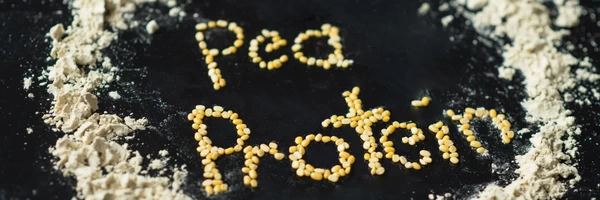Pea Protein
Table of Contents

Introduction
Protein isolate isolated from yellow peas, also known as pea protein, is used as a dietary supplement. Its high protein content, health benefits, and suitability for vegan and vegetarian diets have all contributed to its meteoric rise in popularity in recent years. If you're looking to up your protein intake without significantly increasing your calorie intake, pea protein is a great choice because it's a high-quality protein source with a low fat and carbohydrate content. Nutritional facts of Pea protein per scoop:
|
Calories |
130 |
|
Carbs |
0.99 |
|
Protein |
30.03 |
|
Fat |
0 |
|
Fiber |
0 |
What Is Pea Protein?
Legumes, specifically yellow split peas, are used to create pea protein. The peas are dehulled and ground into a powder before being used. Protein powder, bars, and other forms are produced by combining the powder with water and other ingredients. Pea protein is a complete protein because it contains all nine essential amino acids and is thus a high-protein food. For those on a low-carb or low-fat diet, it's a great choice because it has few of both fat and carbs.
Potential Health Benefits of Pea Protein
Numerous studies have shown the usefulness of pea protein. For starters, it's a great way to get protein into your system because it's highly bioavailable and simple to digest. Additionally, it does not contain any dairy or gluten, making it a great option for people who have dietary restrictions. Since it comes from a plant rather than an animal, pea protein can be included in vegetarian and vegan diets. In addition to lowering cholesterol levels and reducing the risk of heart disease, pea protein may also help with weight loss by suppressing appetite and increasing satiety.
Pea Protein: How to Use It
You can get your pea protein fix in a variety of convenient snack forms, such as powder, bars, and other edibles. Numerous food preparations can benefit from its addition, including protein shakes, smoothies, and baked goods. Pea protein-based products, like protein bars, snacks, and meal replacements, can be a tasty and easy way to increase your protein consumption.
Possible Downsides of Pea Protein
Although pea protein is typically safe and well-tolerated, you should be aware of a few potential side effects. It's important to test your body's reaction to pea protein gradually because some people are allergic to peas or have digestive issues when eating it. Some people may not enjoy the taste or texture of pea protein.
Conclusion
Pea protein is a versatile and healthy protein option that can be incorporated into a wide variety of diets. Numerous pea protein-based products offer a simple and palatable way to increase your protein consumption and can be easily incorporated into your diet. To be safe, it's best to keep an eye on how your body reacts to pea protein, just like you would with any dietary supplement. In sum, pea protein is something to consider including in your daily diet.
Buy Pea Protein From Amazon

Read here why protein is required during the lifestyle modification journey?
